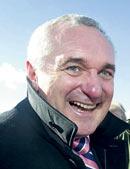The Bertie factor

For Bertie Ahern the election was a triumph. It seemed at the beginning of the campaign he might lose and lose in disgrace because of the revelations about his finances. He seemed almost a forlorn figure at the Palace of Westminster nine days before the election as he was feted by British Parliamentarians while seeming rejected by his electorate. That turned around in part because the media and public were befuddled by the information he put into the public domain about his finances, in part by a residual affection for him and in part because he showed himself so much more competent than his opposite number in the leaders' TV debate.
But there were other factors. The brilliant management of the campaign by Brian Cowen and PJ Mara. And the performance of Brian Cowen, especially when the going got rough. He steadied the Fianna Fáil nerve and put it up to the opposition on the management of the economy.
For Bertie Ahern the winning of three successive election is an astonishing achievement. Nobody has done this since Eamon de Valera in the 1940s. This period from 1997 will be known as “the Bertie era”, a tribute to an extraordinary “ordinary” man, whose primary qualities are likeability, diligence and that cunning, now so celebrated.
But there are problems ahead.
The first concerns his money. When/if he gets to give evidence at the Planning Tribunal in answer to allegations that he got £80,000 from Owen O'Callaghan he will be required to explain some very curious transactions and claimed transactions through his bank accounts and that of his former partner, Celia Larkin. He will also have to explain how he managed to save such a spectacular proportion of his known income while he was Minister for Finance.
He claimed to have saved £50,000 while he did not have a bank account from 1987 to 1993 and at a time when he must have been paying significant amounts in family maintenance and towards the mortgage of the family house. Then in a period of about 10 months he saved a further £28,000 in 1994 out of net salary of around £35,000.
He will have to explain why he proposed spending £50,000 on the renovation of a house he was merely going to rent and why the owner or would-be owner of that house was prepared to spend £30,000 on the refurbishment of that same house, which was worth just £130,000 and was merely four years old.
And then he will have to explain why he claimed to have lodged monies in the accounts of his then partner when there is no record of such lodgements and lots more.
Almost certainly none of this money came from Owen O'Callaghan, the Cork developer at the centre of the Mahon Tribunal enquiries into Quarryvale/Liffey Valley.
There are no obvious simple answers to the questions that arise about his money and this is likely to be the cause of a major crisis of conscience for the Green Party when these issues come to a head probably late this year or early in 2008.
There is a prospect that that the Planning (Mahon) Tribunal will have been closed down by then either by itself or by the courts because of the issues that are now emerging about its procedures and conduct (see ‘Tribunal Fiasco: Bertie's tribunal in crisis' page 16).
And then there is the retirement issue.
Bertie Ahern has said he will not stand in the 2012 general election and therefore will not lead Fianna Fáil into those elections. He has insisted he will remain on as Taoiseach until the end of this 30th Dáil but, in reality, this is not feasible. He will have to allow his successor sufficient time to ease himself into the role of Taoiseach, certainly a year, maybe more.
From about a year's time there will be media speculation on the timing of Bertie's retirement (all the more so if he is embroiled in controversy at the tribunal) and that in itself will prove destabilising and may cause him to go even earlier.
